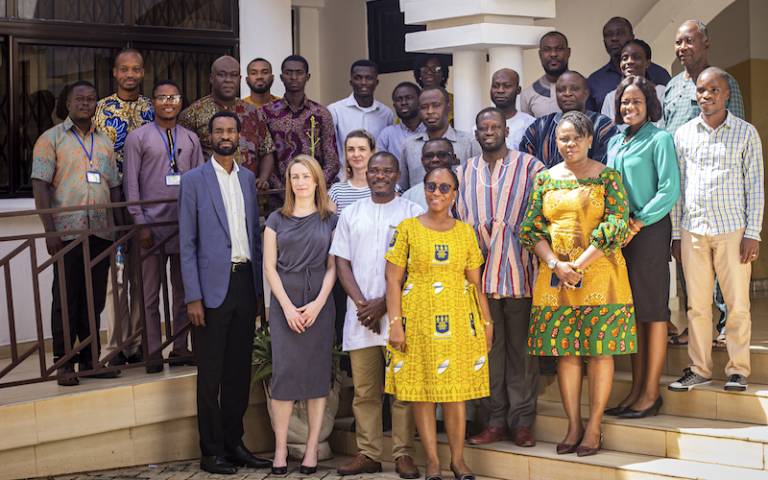Blog: UCL researchers co-publish report on 'Greening the recovery in Ghana'
30 May 2023
Researchers from the UCL Institute for Sustainable Resources and the Ghanaian Institute of Statistical, Social and Economic Research (ISSER) have launched their final report, engaging stakeholders on pathways for greening Ghana’s COVID-19 recovery

A blog by Simon Bawakyillenuo
A launch event was held recently in Ghana at the ISSER Conference Facility to launch the discuss the findings from the Ghana component of the ‘Greening the Social and Economic Recovery in Ghana and Zambia’ project.
The two-year study was carried out by research teams at the Institute of Statistical Social and Economic Research (ISSER), University of Ghana, the University College of London (UCL), UK, and the Zambia Institute for Policy Analysis and Research (ZIPAR), is a response to calls in the wake of Covid-19 to re-think the direction of economic and social development.
As part of the project, the research team analysed stakeholder views on what a green recovery from Covid-19 could look like, co-developed future economy-wide scenarios with these stakeholders, analysed the energy system implications using quantitative models and developed recommendations for policymakers.
The Ghanaian report, 'Greening the Recovery in Ghana', was launched by ISSER Director, Prof. Peter Quartey, alongside project team members present. Besides the in-person participants, the launch was attended virtually by co-researchers and partners who contributed to the implementation of the project.
Among other outcomes, the report recommends adopting a blended scenario or decarbonisation pathway based on the country’s economic situation, that is, continuing to invest in fossil fuel industries in the short term while increasing investment in green initiatives in the medium to long term, using resource taxes to ensure that the wealth is spread fairly and to generate funds for public investment in crucial social services.
It further outlines seven key recommendations for ensuring the success of this approach, which will eventually culminate in the leapfrog pathway. These include:
- Enhance the re-alignment of major development frameworks of the country towards a Green Economy paradigm.
- Restructure COVID-19 recovery policies and programmes especially, the Ghana Covid-19 Alleviation and Revitalization of Enterprises Support (Ghana CARES ‘Obaatampa’ programme) to have a greater focus on green transformation.
- Update the scope and orientations of existing policies relevant to de-carbonisation and sustainability to be in sync with the current realities of the COVID19 recovery.
- Revamp and sustain existing green initiatives in Ghana.
The report outlines the following additional recommendations:
- Instil harmony between all sectoral policies and green initiatives
- Develop innovative financing and incentive packages for green initiatives
- Strengthen both the administrative and fiscal decentralised structures of Metropolitan, Municipal and District Assemblies and set evaluation benchmarks for them.
The dissemination workshop featured insightful presentations and discussions from all onsite and online participants. In remarks ahead of the launch, Prof. Quartey congratulated the research team on the successful completion of a robust study that will contribute significantly to strengthening Ghana’s recovery from Covid-19 and climate change-related development challenges. He reminded participants of ISSER’s continued openness to engaging in research collaborations and contributing to finding solutions to development problems in and beyond Ghana.
Held at the ISSER Conference Facility on May 26, 2023, the hybrid event brought together a community of experts and stakeholders from academia, industry, civil society organisations (CSOs), and government institutions. These included representatives from the National Petroleum Authority (NPA), Public Utilities Regulatory Commission (PURC), Ministry of Finance (MoF), Ministry of Food and Agriculture (MoFA), Forestry Commission, Public Procurement Authority, and Energy Commission.
CSOs representation included ABANTU for Development, Kumasi Institute of Technology, Energy and Environment (KITE), Ghana Alliance for Clean Cookstoves & Fuels (GHACCO), African Foundation for Climate Change and Sustainable Development (AFCCSD), Peasant Farmers Association of Ghana (PFAG). The media was also present to report on the key takeaways of the discussions.
Links
Image credit: Institute of Statistical, Social and Economic Research, Ghana.
 Close
Close

